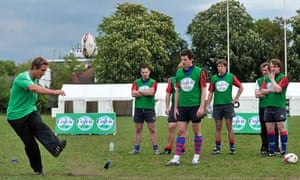Training for a major sporting event should be no different to preparing for any other big occasion in your life. It is important to prepare physically and mentally in the lead-up in order to perform at your peak during the event itself. You need to make sure that every single second of preparation counts.
A key element of preparing effectively is aspiring to do your best at all times. If I leave the field knowing that I was the best that I could be, then I know my training and preparation was effective. Average preparation or a lacklustre training session is pointless and can be counterproductive.
I spend less time on the training field than I used to, but I make sure that my training is more efficient and intense. Aim to train harder than the event will ever be, put yourself under more pressure than you will be under during the event, and learn to thrive under that pressure. That way, when it comes to the big day you will be prepared and ready for anything. You will be master of your own destiny.
To compliment effective training, you should be eating and drinking well. Proper nutrition is enormously important. I would recommend eating a lot of good proteins and carbohydrates that keep your energy at a high level. Training is designed to break the body down, and if you do not refuel and rebuild effectively afterwards, it can damage the body instead of developing it.
Hydration is also essential to ensure you are performing at your peak, both physically and mentally, which is why I am doing the Volvic challenge (trying to drink 1.5 litres of water every day for 14 days).

It is really important to prepare mentally as well. People often underestimate the mental side to rugby. To those who are not fans of the game, it can look like a hugely physical sport with little nuance or skill. Those who love the game, like me, would completely disagree! When you play or watch a lot of rugby it soon becomes apparent that there is a huge mental and tactical side to it, and a lot of the mental preparation lessons that I have learned can be transferred to any walk of life.
I would go so far as to say that the mental side of my game, and the mental preparation I go through, has been as big a part of my career as the physical preparation I do in the gym and on the training field. I try to always do three things when preparing mentally for any big game or training session:
• Visualise success. If you can imagine yourself achieving something or performing a certain skill then it becomes easier to achieve in reality.
• Remain positive. Getting over a mistake instantly and concentrating on the positive things you are going to achieve will help you to perform better and stop you dwelling on negative thoughts.
• Set realistic goals. Don’t expect that you will be able to achieve miracles – set realistic goals and visualise them. That way, success will come more quickly and progression will be easier.
As my career has progressed, I have also developed a healthier view of success and failure. Success should be rewarded: take a moment to celebrate when you do something well. When you work really hard to achieve something and finally manage it, then it’s a real shame not to stop and take stock of what you have done.
Failure, on the other hand, should not be feared. I definitely don’t fear failure any more: I treat it as a lesson. Try to learn from your failures – the quicker you learn from them, the quicker you’ll be ready to succeed under pressure. Preparing for pressure is a huge part of mental preparation, and learning from your mistakes is a great way to know what can go wrong, and what you need to do to make sure it doesn’t happen again.
Don’t forget to make time for rest and relaxation. You should be regularly resting your body, relaxing and enjoying yourself to make sure your mind switches off when you’re not working. This allows you to be fully focused during training sessions.
In summary
In order to work to your maximum potential and at the highest possible level of performance, you need to be mentally prepared and physically capable to thrive under pressure. This can be achieved by striving for perfection, learning from mistakes, and habitually pressurising yourself to make a game scenario second nature.
• Next week: Johnny Wilkinson on recovering from injury, and the importance of nutrition.
Source: Read Full Article
